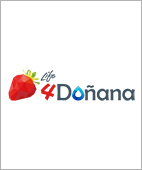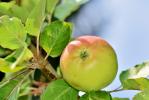
LIFE Project: Improved techniques to optimize water and nutrient use in strawberry production near Doñana National Park
- Type Project
- Status Filled
- Execution 2020 -2024
- Assigned Budget 2.296.643,00 €
- Scope Europeo
- Autonomous community Andalucía
- Main source of financing LIFE
- Project website Web del proyecto
The LIFE 4DOANA project focuses on demonstrating and promoting the adoption of a new on-demand decision support system (DSS) for intensive soil-based strawberry cultivation, which increases irrigation efficiency and reduces water withdrawals and nutrient pollution.
The rise in intensive agricultural production is causing problems in EU countries due to pressures on water resources, especially in southern France, Spain, and Portugal. Huelva, in Andalusia (southern Spain), has a strawberry cultivation area of 6,600 hectares and a production of 334,767 tons (in 2018). The region accounts for 97% of Spanish strawberry production and more than 25% of EU production. However, more than 7,900 hectares of berry crops, of which 40% are strawberry farms, are located north of Doñana National Park, one of the largest wetland complexes in Western Europe and a Natura 2000 and Ramsar site. Strawberries in this area are grown using groundwater from the "Almonte-Marismas" aquifer 27, which also feeds several wetlands in Doñana.
This overpressure on the aquifer and the decline in groundwater levels are affecting Doñana, causing changes in vegetation, drying up ponds, and impacting some bird populations. The wetlands are also experiencing rapid eutrophication linked to excess nutrients from agricultural activity. Regional authorities have implemented a Special Land Use Plan to improve irrigated agricultural areas north of the Doana forest and have acquired farms to reduce water withdrawals from the aquifer.
However, despite these initiatives, in February 2019, the Guadalquivir Hydrographic Confederation initiated proceedings to declare three of the five aquifers as groundwater bodies at risk of not achieving the required good status. In parallel with public initiatives, it is important to continue engaging farmers and agricultural professionals in improving management and reducing pressure on the aquifer.
In this regard, innovative irrigation and fertigation systems, such as on-demand decision support systems (DSS), offer great potential to reduce quantitative and qualitative pressures through greater water and nutrient use efficiency. However, they are rarely adopted on soil-based farms in the area or in other EU regions.
There is a significant need to demonstrate the environmental and economic benefits of water-saving systems to encourage their adoption by farmers, along with support from advisory services.
- To demonstrate the technical, environmental, and socioeconomic benefits of on-demand DSS for improved irrigation and nutrient management on commercial strawberry farms in the Doñana National Park area (Huelva, Spain).
- Develop and implement virtual and on-farm advisory and training systems to encourage the adoption of techniques and practices for improved water and nutrient management in soil-based strawberry production.
- Promote the replication and transfer of project technologies in Huelva (Spain) and in Portugal and France, countries with high pressures on water resources due to intensive agriculture.
- Evaluate the environmental and socioeconomic impact of the project's actions.
- Disseminate the project results to the general public and transfer the results and lessons learned to strawberry growers, public authorities, and other relevant stakeholders.
An innovative on-demand DSS for improved water and nutrient use demonstrated on six commercial soil-based strawberry farms (estimated area of 3 ha per farm).
On-site advisory services on improved water and nutrient use practices were provided to 40 strawberry growers in the vicinity of Doñana National Park.
At least 100 strawberry producers and technicians are receiving training and advice through the project's virtual advisory and training platform.
Business plans and replication initiatives were developed to bring the new on-demand DSS for intensive soil-based agricultural production and premium agricultural advisory services on improved water and nutrient use to the EU market.
Water use (m3/ha) was reduced by 20% and yields increased by 4% in the project's demonstration fields.
10% reduction in the use of chemical fertilizers (kg/ha) in the project's demonstration fields.
More than 70% of the farmers and technicians trained and advised through the project's virtual advisory and training platform indicate that the training has allowed them to implement changes on their farms to improve water and nutrient use.
The 40 farmers who received technical advice reduced their water use by at least 7%.
- Coordinator/entity name: María Fernández
Postal address: C/ Arquitectura, 5, floor 4, module 2, 41015, Seville
- Gabinete de Iniciativas Europeas S.L.
- HIDROSOPH(Hidrosoph, Lda)
- CICYTEX(Centro de Investigaciones Científicas y Tecnológicas de Extremadura)
- FAMIDAN(FAMIDAN S.L.)
- KNITINK(KNITINK TECHNOLOGIES, S.L.)
- FAECA(Cooperativas Agro-alimentarias de Andalucía)







